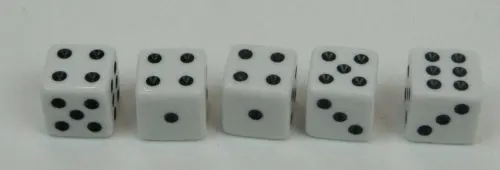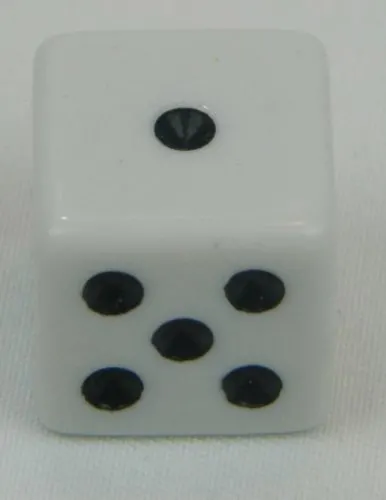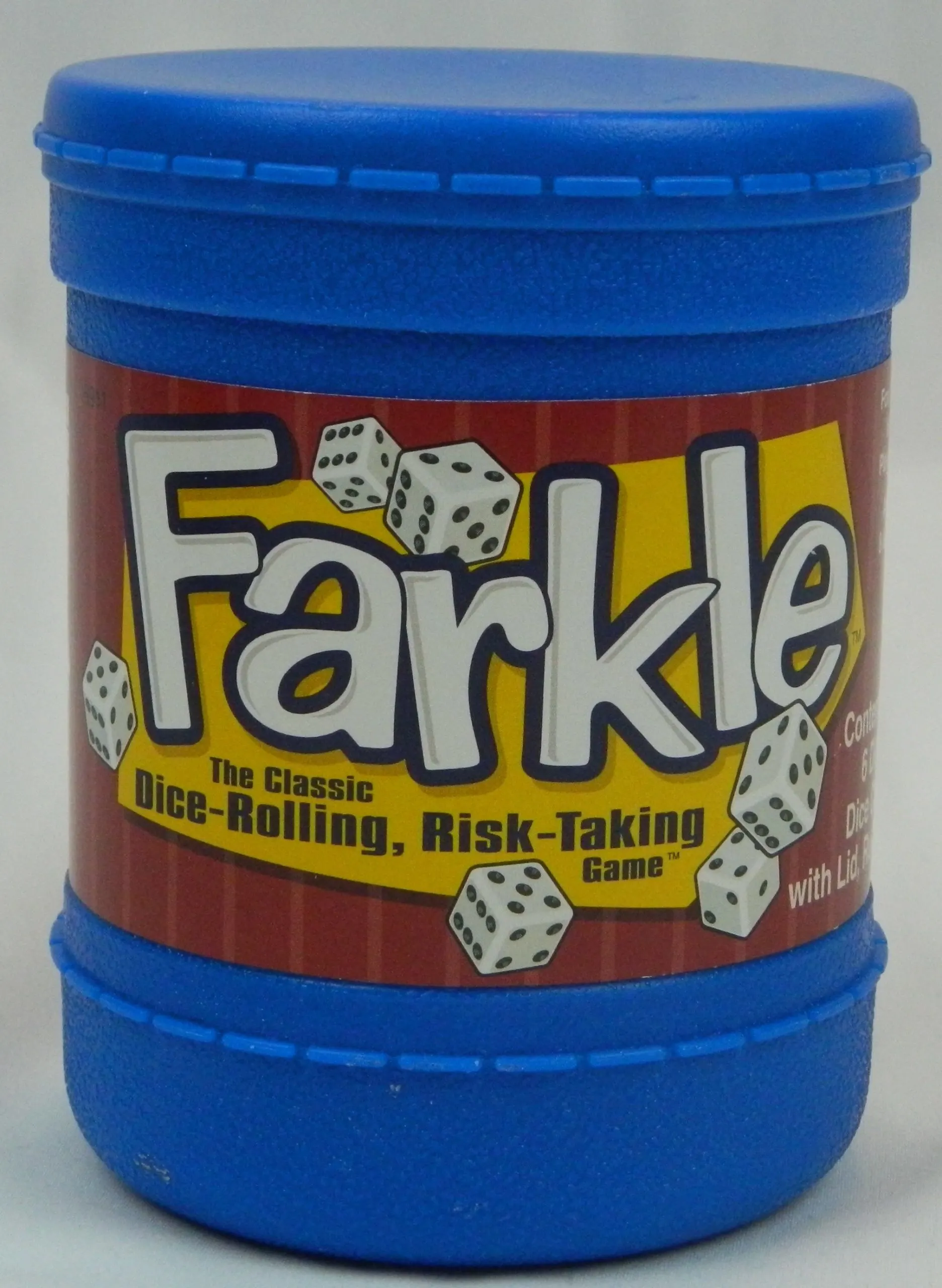Ever since the invention of the standard six sided dice, many different dice games have been created. There are some games that buck the trend, but I would say that most dice rolling games follow a very similar formula. Basically you roll dice in order try and get different combinations to score points. The most famous dice game that utilizes this formula is probably Yahtzee. A more recent game that has become quite popular in this genre though is Farkle. While I generally enjoy dice rolling games, I am not the biggest fan of these more basic dice rolling games. Farkle will have an audience that will love it, but in my opinion it is a very generic, flawed, and ultimately boring dice game.
How to Play Farkle
Setup
- Pick one player to be the scorekeeper.
- All of the players will roll one die. The player that rolls the highest number will get to go first. Play will pass left/clockwise throughout the game.
Playing the Game
On your turn you will roll the six dice.
After each roll you will set aside the dice that are worth points and roll the rest of the dice. You must set aside at least one scoring dice. All dice that are set aside cannot be re-rolled for the rest of your turn (unless you roll out). If you can’t set aside any dice, you will “Farkle” and your turn will end immediately. You will also lose all of the points that you earned on your turn.

For their first roll this player rolled a one, two, three, two fours, and a six. As the one is the only dice that will score points, the player will set that dice aside.
You then have the option of stopping and banking the points that you have scored on your turn, or rolling the dice that you didn’t set aside to try and score more points. Before you can write down any score, you need to score at least 500 points in a turn. After this you can stop rolling at any time.

In their second roll the player rolled three fours, a five, and a six. The three fours will score 400 points, and the five will score 50 points.
If you end up scoring all six dice, you can re-roll all of the dice again in order to score points. Keep track of your current score before re-rolling all of the dice though.

For their third roll the player rolled a one on their last dice. As they scored with all six dice, they can roll all of the dice again.
After you bank your points or roll a “Farkle”, play will pass to the next player clockwise.
Scoring
When rolling dice there are a number of different combinations that will score you points. For a combination to score points, all of the numbers in the combination must be rolled at the same time (you can’t use numbers from several different rolls). The combinations that you can roll and how many points they are worth are as follows:
- Single 1 = 100 points
- Single 5 = 50 points
- Three 1s = 300 points
- Three 2s = 200 points
- Three 3s = 300 points
- Three 4s = 400 points
- Three 5s = 500 points
- Three 6s = 600 points
- Four of Any Number = 1,000 points
- Five of Any Number = 2,000 points
- Six of Any Number = 3,000 points
- 1-6 Straight = 1,500 points
- Three Pairs = 1,500 points
- Four of Any Number With A Pair = 1,500 points
- Two Triplets = 2,500 points

During their turn this player rolled a one in their first roll which will score 100 points. In their second roll they rolled three fours which scores 400 points and a five which will score 50 points. The six won’t score any points. They ended up scoring 550 points.
Winning the Game
Once a player’s score surpasses 10,000 points, all of the players will get one chance to beat the current leader’s total. After everyone has had one chance to beat the high score, the player with the highest score will win the game.
My Thoughts on Farkle
Since it was created back in 1996, Farkle has become a pretty popular dice game. I had never played Farkle mostly because it just seemed like a pretty standard dice game. Roll the dice and try to get different combinations. I had already played quite a few different games with the exact same premise so I didn’t really see any reason to rush and check out the game. With how popular the game is though, I decided to finally check it out. While not terrible, I wouldn’t consider myself a fan.
Like most dice games, the premise behind the game is pretty simple. Basically players take turns rolling the dice in order to try and get various dice combinations. These mostly involve rolling multiples of the same number or a straight. You also score points for rolling ones and fives though. If you roll a scoring combination you can then choose whether to keep the points you rolled or if you want to keep rolling the dice that you didn’t score to try and score more points. If you should fail to roll any dice that score you additional points though, you lose all of the points that you already earned on your current turn.
If this sounds like a lot of other dice games, it should because a similar premise is used by a lot of dice games. Most of the gameplay comes down to risk versus reward. Choosing whether to stop or keep rolling is the decision that mostly drives how well you will do in the game. Do you want to play it safe and take the guaranteed points leaving other potential points on the table? Or do you risk everything you already earned to try and score more points? I don’t mind risk/reward mechanics, but I wouldn’t call them one of my favorites.
The biggest problem that I had with Farkle is that the risk/reward element is basically all the game has to offer. The risk/reward mechanic is not bad as what you choose can have a pretty big impact on the game. If you are overly cautious or take too many risks you will have a hard time winning. The strategy in the game is very limited though. The rules didn’t make it clear if you could choose to re-roll scoring dice instead of scoring them. We ended up allowing this as it added a little strategy to the game as you could re-roll low scoring combinations in order to increase your chance of rolling a scoring combination on your next roll. Otherwise there really isn’t much strategy to the game. The game is basically just an exercise in statistics and luck.
This is made worse by the decision to not allow players to use dice from previous rolls to score points. This rule is important to the game as it would play quite a bit differently if you didn’t use it. I don’t like the rule though as it eliminates a lot of the already limited strategy from games like Yahtzee. This is one of the reasons why I prefer Yahtzee over Farkle. I am not a big fan of Yahtzee either. By using dice from all of your rolls together, there is a little strategy as you have more options over what dice you choose to keep and which you get rid of. You could choose to keep dice that are needed for a harder combination which will score you more points. Of you could take a less risky position in order to guarantee yourself some points during the round. None of this is present in Farkle as you can’t choose to keep dice to set up combinations with future rolls.
All dice games require a lot of luck. Farkle seems to rely on even more though. With the decisions in the game being quite limited, it means that you can’t really compensate for back luck. If you roll poorly, there really isn’t anything that you can do. If you roll poorly you have no chance of winning the game. Those who roll really well will also have a really big advantage in the game. I don’t mind some luck in games, but when a game relies almost entirely on it, it just feels kind of random where you aren’t really even playing a game. Unless you can somehow improve your odds of rolling specific numbers, you don’t really have much impact on your fate in the game.
In addition to the reliance on luck, I wasn’t a huge fan of some of the scoring mechanics either. Some of the scores seem to be a little off in my opinion. First I am not a fan of the rule that you need to score at least 500 points on your first roll before you can otherwise score points. This just drags the game out in my opinion since if you roll poorly it could take several rounds before you are even able to score points. I also don’t really see the point of keeping three twos for example as at only 200 points you would be better off just re-rolling the dice if you have other scoring combinations that you could keep that round. The only reason to keep three twos would be if they were the only scoring combination you rolled in a round or those three dice were your last dice allowing you to re-roll all of the dice. There are other combinations that seem to be worth too many or too few points as well.
While I was playing Farkle I kept having the feeling that the gameplay seemed really familiar. Part of that is because on the same day I also played Risk ‘n’ Roll 2000. It was also because a few years back I played a game called Scarney 3000. Since I reviewed that game I had mostly forgotten how it was played so I did a quick refresher. It turns out that Farkle and Scarney 3000 are very similar. Honestly the main difference in Scarney 3000 is that the twos and fives were replaced with “Scarney” which slightly impacted the scoring. From what I can remember of the game, it was worse than Farkle as the few differences between the two games made Scarney 3000 a worse game.
If it wasn’t clear by the rest of this review, I wasn’t really a fan of Farkle. It just doesn’t do anything particularly original, and just feels like every other dice game. On top of that I have played other dice games that give players more options and thus are just more entertaining to play. That said there are a lot of people that do enjoy the game, so I am not going to pretend that no one should play the game.
I think the main reason why a lot of people enjoy Farkle is that it is quite easy to play. If you have ever played a dice game before, you can pick it up almost immediately. Even if you have never played a similar game before, the rules are simple enough that it can be picked up within just a couple minutes. This simplicity means that the game can be played by people of almost any age. The game has a recommended age of 8+, but I think kids a little younger could also play the game. The game is simple enough as well where people who rarely play board games may be interested as it is simple enough where it doesn’t feel overwhelming.
This leads Farkle to have a relaxed feel to it. The game’s length will somewhat depend on how lucky players get, but games shouldn’t take too long. Therefore I can see it working well as a filler game or a game to break up more complicated games. Farkle’s greatest strength is probably that it isn’t a game that you have to put too much thought into. The gameplay is simple enough that you don’t have to analyze a bunch of different options before making a decision. It is the type of game that you can enjoy while having a conversation with your friends/family.
As for the game’s components, the game itself is not all that necessary. What I mean by this is there really is no reason that you have to buy the game as basically all you get is six standard dice, some versions include scoresheets, and the instructions. If you have six standard dice sitting around the house you can play the game without having to pick up another game. Farkle is generally quite cheap which helps some, but I have never been much of a fan of games that package standard dice or cards and tries to sell it as a whole new game. If you could find the game for really cheap it may still be worth picking up, but otherwise it would be easy enough to make your own version of the game.
Should You Buy Farkle?
At the end of the day I wouldn’t say that Farkle is a terrible game. I wouldn’t say that it is good either though. Some people will enjoy the game because it is easy to play and is the type of game that you don’t have to put too much thought into what you are doing. The problem is that the game has few decisions to make in it. You basically get to choose between playing cautiously or aggressively. Otherwise much of the game relies on your luck in rolling the dice. If you roll poorly you have no chance of winning the game. This leads to a somewhat boring experience that is very similar to a lot of other dice games. It also doesn’t help that the game basically just consists of six standard dice.
If you don’t generally care for dice games or want one that actually gives players some interesting choices, Farkle is unlikely to be the game for you. Those that want a really simple dice game though, may find enough in Farkle to make it worth picking up if you can get a really good deal on it.
Buy Farkle online: Amazon, eBay. Any purchases made through these links (including other products) help keep Geeky Hobbies running. Thank you for your support.

